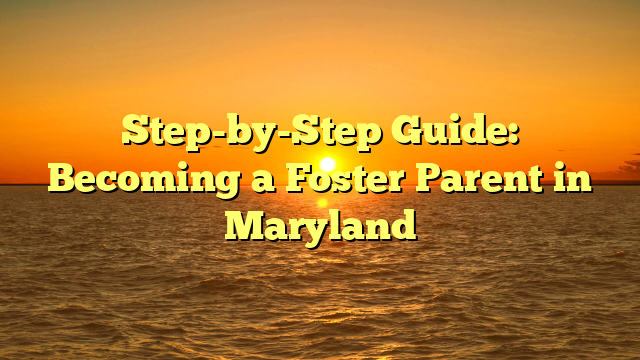Step-by-Step Guide: Becoming a Foster Parent in Maryland
Introduction
Becoming a foster parent is a rewarding and life-changing experience. If you live in Maryland and are interested in opening your heart and home to a child in need, this step-by-step guide will provide you with all the information you need to navigate the process.
Requirements
Before you begin the process of becoming a foster parent in Maryland, it’s important to understand the requirements set by the state. Here are the key criteria:
- Age: You must be at least 21 years old.
- Residency: You must be a resident of Maryland.
- Background check: You and all adult household members must undergo a criminal background check.
- Health assessment: You and all adult household members must undergo a physical examination.
- Training: You must complete a pre-service training program.
Application Process
Once you meet the requirements, you can begin the application process. Here are the steps involved:
- Attend an orientation: The first step is to attend an orientation session where you will learn more about the foster care system and the responsibilities of a foster parent.
- Submit an application: After attending the orientation, you will need to submit a formal application to the Maryland Department of Human Services.
- Background checks: You and all adult household members will undergo a criminal background check.
- Home study: A social worker will visit your home to conduct a home study. This includes interviews with all household members, a safety inspection, and an assessment of your ability to provide a nurturing environment.
- Training: You will be required to complete a pre-service training program that covers topics such as child development, trauma-informed care, and behavior management.
- Approval: Once all the necessary checks and assessments are complete, you will receive a decision on your application. If approved, you will be officially licensed as a foster parent.
Support and Resources
As a foster parent, you will have access to a range of support and resources to help you navigate the challenges and joys of fostering a child. Here are some of the key resources available:
Support Groups
Support groups provide a safe space for foster parents to connect with others who are going through similar experiences. These groups offer emotional support, advice, and a sense of community.
Training and Workshops
Continuing education is important for foster parents to enhance their skills and knowledge. Maryland offers various training programs and workshops on topics such as trauma-informed care, cultural competency, and therapeutic interventions.
Financial Assistance
Foster parents in Maryland receive financial assistance to help cover the costs of caring for a child. This includes a monthly stipend, medical coverage for the child, and reimbursement for certain expenses.
Respite Care
Respite care provides temporary relief for foster parents by offering short-term care for the child. This allows foster parents to take a break, attend to personal matters, or simply recharge.
Conclusion
Becoming a foster parent in Maryland is a journey that requires dedication, compassion, and a willingness to make a difference in a child’s life. By following this step-by-step guide, you will be well-prepared to embark on this rewarding and transformative experience. Remember, every child deserves a loving and supportive home, and you have the power to provide just that.
| Requirement | Maryland | Virginia | Pennsylvania |
|---|---|---|---|
| Age | 21 | 21 | 21 |
| Residency | Maryland | Virginia | Pennsylvania |
| Background check | Yes | Yes | Yes |
| Health assessment | Yes | Yes | Yes |
| Training | Yes | Yes | Yes |
